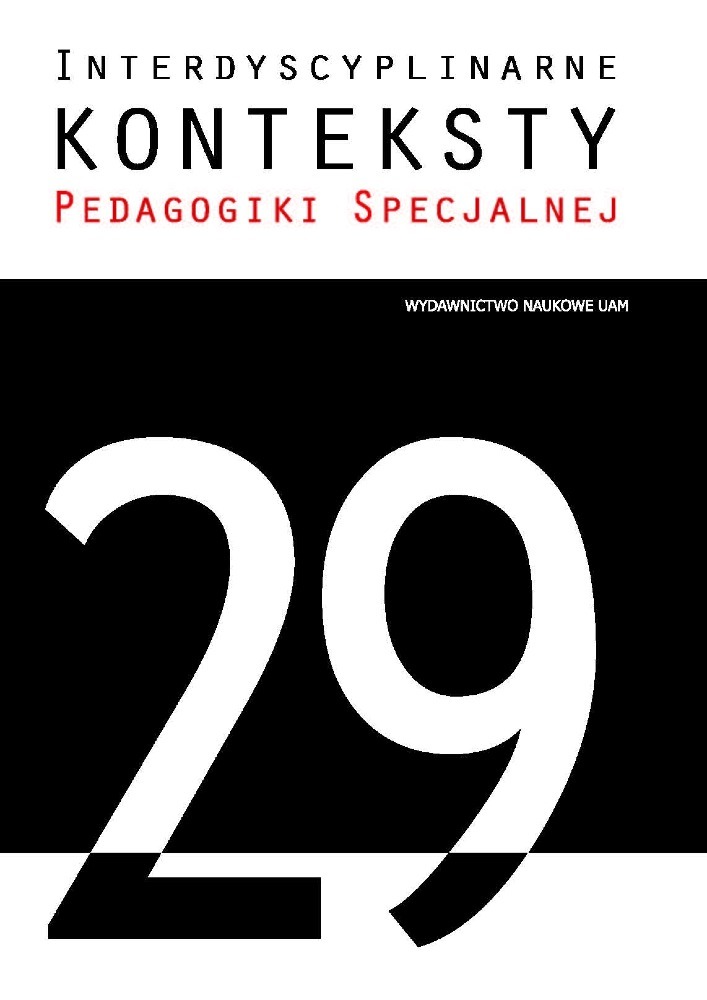Abstract
The family in the lives of people with intellectual disabilities is not only their closest and most essential social group, but often also their basic or even the only source of support in everyday life from childhood to the late old age. In a situation of adults with intellectual disabilities who start a new romantic relationship (of a formal or informal nature), the family of origin may play different roles and occupy different places in their everyday lives. The research using the phenomenographic method of qualitative research on experiences related to being in long-lasting romantic relationships conducted with adults with intellectual disabilities allowed the author to show the place of family members (parents, siblings, extended family) in their everyday lives and in their relationships with partners.
References
Charmaz K. (2009), Teoria ugruntowana. Praktyczny przewodnik po analizie jakościowej, PWN Warszawa.
English B., Tickle A., das Nair R. (2018), Views and Experiences of People with Intellectual Disabilities Regarding Intimate Relationships: A Qualitative Metasynthesis, “Sexsuality and Disability”, No. 36, pp. 149–173.
Johnson K., Frawley P., Hillier L., Harrison L. (2002), Living safer sexual lives: research and action, “Tizard Learning Disability Review”, No. 7(3), pp. 4–9.
Keith K.D., Schalock R.L. (2016), People speaking for themselves, [in:] R.L. Schalock, K.D. Keith (ed.), Cross-cultural quality of life: Enhancing the Lives of People With Intellectual Disability, American Association of Intellectual and Developmental Disabilities, Washington.
Kijak R. (2016), Dorośli z głębszą niepełnosprawnością intelektualną jako partnerzy, małżonkowie i rodzice, Wydawnictwo Naukowe UP, Kraków.
Krause A., Żyta A., Nosarzewska S. (2010), Normalizacja środowiska społecznego osób z niepełnosprawnością intelektualną, Wydawnictwo Edukacyjne Akapit, Toruń.
Kruk-Lasocka J., Antosz W. (2018), Koszula i krawat. Obrazki wyłaniającej się dorosłości, Oficyna Wydawnicza „Impuls”, Kraków.
Krzemińska D. (2019), Być parą z niepełnosprawnością intelektualną. Studium mikroetnograficzne w kontekście teorii postkolonialnej Homiego K. Bhabhy, Oficyna Wydawnicza „Impuls”, Kraków.
Marton F. (1981), Phenomenograpgy – describing conceptions of the world around us, “Instructional Science” No. 10, pp. 177–200.
Marton F. (1986), Phenomenography – A research approach to investigating different understandings of reality, “Journal of Thought”, vol. 21, No. 3, pp. 28–49.
Marton F. (1988), Phenomenography: Exploring different conceptions of reality, [in:] D.M. Fetterman (ed.), Qualitative approaches to evaluation in education: The silent scientific revolution, New York, Praeger, pp. 176–205.
Marton F. (1994), Phenomenography, [in:] T. Husén, T.N. Postlethwaite (ed.), The International Encyclopedia of Education, Issue 2, vol. 8, Oxford, Pergamon, pp. 4424–4429.
Męczkowska A. (2003), Fenomenografia jako podejście badawcze w obszarze studiów edukacyjnych, „Kwartalnik Pedagogiczny” No. 3(189), pp. 71–89.
Myśliwczyk I. (2019), Uznanie dorosłości człowieka z niepełnosprawnością. Studium socjopedagogiczne narracji osób z głębszą niepełnosprawnością intelektualną w stopniu głębszym, Oficyna Wydawnicza „Impuls”, Kraków.
Parchomiuk M. (2016), Seksualność człowieka z niepełnosprawnością intelektualną, Oficyna Wydawnicza „Impuls”, Kraków.
Paulston R.G. (1993), Pedagogika porównawcza jako pole nakreślania konceptualnych map teorii paradygmatów, [in:] Z. Kwieciński, L. Witkowski (ed.), Spory o edukację. Dylematy i kontrowersje we współczesnych pedagogiach, Wyd. IBE-Edytor, Warszawa–Toruń, pp. 25–50.
Walker-Hirsch L. (2002), Building relationships/social and sexual development, [in:] W.I. Cohen L. Nadel M.E. Madnick (ed.), Down Syndrome. Visions for the 21st century, A John Wiley&Sons, Inc., New York.
White E., Barnitt R. (2000), Empowered or discouraged? A study of people with learning disabilities and their experience of engaging in intimate relationships. “British Journal of Occupational Therapy”, No. 63(6), pp. 270–276.
Żyta A., Ćwirynkało K. (2020), Związki uczuciowe osób z niepełnosprawnością intelektualną, Olsztyn, Wydawnictwo Uniwersytetu Warmińsko-Mazurskiego (paper in press).
